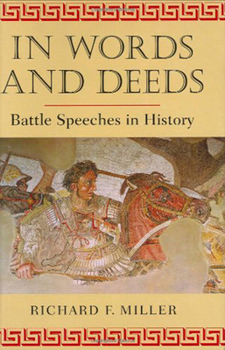In Words and Deeds: Battle Speeches in History
Throughout recorded military history, leaders have persuaded men to risk life and limb for God, country, unit, comrades, and families; for plunder, vengeance, glory, a lasting peace, or new conquests. Beginning with the holy wars of the Hebrew Bible and continuing to the present Iraq conflict, one constant motivator of men in war has been the battle speech: the exhortatory words uttered by commanders on the eve of invasions and before, during, after, and between battles. In Greco-Roman times, battle speeches, as recorded (or invented) by historians such as Herodotus, Thucydides, and Livy were considered literary creations of a high order. In the centuries that followed, both biblical and Greco-Roman narratives established the templates that have influenced military exhortations to the present day. Emotions inspired by the battle speech might be universal, but conceptions of God, the rules of war, and the proper objects of warfare have evolved to reflect changes in cultural norms, military organization, and technology. Richard F. Miller offers the first systemic classification of battle speeches while exploring how their contents have changed over time. Speeches are classified based on their chronological relation to the battle or tactical circumstance the speaker seeks to address. In many situations, deeds accompany words in a continuum of action that renders both action and words inseparable. Thus, Miller often analyzes both components in a battle sequence. In Words and Deeds relies chiefly on primary texts written either by soldier-participants, or, in the case of the Hebrew Bible and certain Greco-Roman accounts, the most important surviving texts of the ancient wars. For modern European and American military history, the sources are almost exclusively first-hand accounts contained in soldiers' diaries, letters, after-action reports, and memoirs. Secondary sources are used to extract first-hand accounts of words and deeds or to support conclusions about how such speeches have evolved.
Format:Hardcover
Language:English
ISBN:1584657316
ISBN13:9781584657316
Release Date:October 2008
Publisher:University Press of New England
Length:432 Pages
Weight:1.64 lbs.
Dimensions:1.3" x 6.4" x 9.2"
Related Subjects
HistoryCustomer Reviews
0 rating





